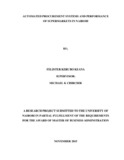| dc.description.abstract | Automated procurement (e-procurement) is a growing aspect of supply chain
management and is receiving a lot of attention from supermarkets globally. This
is because there is stiff competition in the supermarket industry and customers are
exerting pressure on retailers in terms of; demand variability, reduced lead-time, need
for customized products and services. Therefore, supermarkets can longer compete on
cost reduction alone, but also on how efficient they can procure their products and
services. This study set to establish automated procurement systems and
supermarkets performance.This research was carried out through a descriptive design.
The target population of this study was the supermarkets in Nairobi Kenya which are
about 52 supermarkets in Nairobi, Kenya. Given that this is a relatively small
population, a census was used. The researcher mainly used descriptive statistics to
analyze data. This included frequency distribution tables, mean and standard deviation.
Performance of supermarkets was analyzed using correlation and regression analysis. In
order to establish the effect of e-procurement on the performance of supermarkets,
regression analysis was employed. The study revealed that majority of supermarkets
relied on electronic mail and automated identification bar-coding systems to transact
their procurement operations more than any other systems mentioned to them. For
instance, most supermarkets communicated orders through sending emails to suppliers’
sales agents via emails and this hastened the period of delivery and confirmation of
products being available or not. This ensured that there was regularly and constant
communication via email between supermarkets and their suppliers. It was also
established that time was saved and this propelled the retail chains to gain competitive
advantage in the supermarket industry. Moreover, accuracy of products ordered and
delivered was maintained when those systems were used. Bivariate correlation results
showed that there existed a significant positive effect of automated procurement systems
and performance of selected supermarkets in Nairobi city.
Lastly, the results established that the degree of correlation of the independent predictor
(automation of procurement systems) and performance of supermarkets was not strong
due to various challenges stretching from; high cost of system implementation, slow user
acceptance of new automated procurement systems, lack of management support in
adoption of new systems, inadequate IT and networking infrastructure and inadequate
employee training. These among other factors mentioned affected effective utilization of
automation systems on performance of supermarkets. | en_US |

